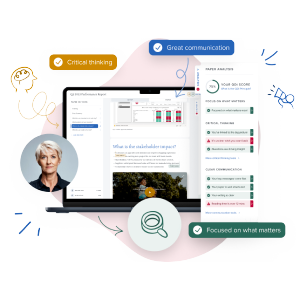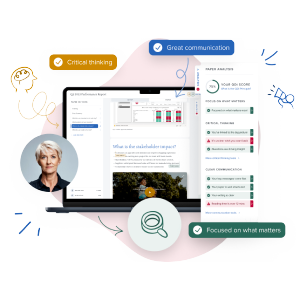Martin Gilbert is chair of Revolut and senior independent director of Glencore. He co-founded Aberdeen Asset Management and was CEO until its merger with Standard Life, after which he served as vice chair of Standard Life Aberdeen and chair of Aberdeen Standard Investments. Previously, he was also deputy chair of SKY and chair of FirstGroup. He has been patron of the The Aberdeen Law Project since 2010.
If you could wave a magic wand, how would you make boards more effective?
I’d have boards be much more questioning when things appear to be going well.
Often, non-executive directors are fully supportive when everything is fine, and only start to truly challenge management when things go wrong. Shouldn’t it be the opposite?
What would your perfect board pack look like?
Boards are given too much information to wade through. Papers should be significantly shorter, so that board members — and especially non-executives — can focus on the key points.
There’s a tendency to think that, the more you give your NEDs, the more you’ll get out of them. But, even with the best will in the world, nobody can absorb reams and reams of complex information. Putting less in the board papers is the only sure way to get more in return.
“We can’t let governance distract boards from strategy.”
One of the major drivers behind packs ballooning in size is the amount of governance that’s now included. That’s not to say we don’t need these issues to be discussed and taken into account, but we can’t let governance distract boards from strategy, or overwhelm it entirely.
In this regard, fintechs tend to fare a bit better. Unencumbered by the legacy issues plaguing older financial institutions, they can focus purely on their customers. It’s very refreshing to go to a Revolut board meeting, where the bulk of the discussion is spent on growth — supported by the right amount of governance — rather than overwhelmingly focused on governance with a bit of time allocated to growth.
Are boards out of touch with society? If so, how can they re-engage?
Most of the people sitting on boards of large organisations lead pretty good lives compared to 99% of the population, so they’re bound to be slightly out of touch. This is especially true when it comes to remuneration.
“The days of autocratic leadership are over.”
It’s frighteningly easy to become isolated — be it from the rest of an organisation when you sit at its top, or from society when you’re privileged. You can’t simply rely on what’s being reported to you by people who might have the exact same blinders on as you do. You need to pay your stakeholders frequent visits and find out what’s actually going on at the grassroots level. The days of autocratic leadership are over.
Have the dynamics of meetings changed now they’ve gone remote?
Many still don’t quite get the etiquette of remote meetings. I’m afraid older board members like myself don’t put our phones on mute nearly as much as we should! If remote meetings are to become the norm, we’ll need more formality around them: someone should control the mute button centrally, with directors having a way to request being next to speak, etc.
“I still don’t think remote meetings can be perfect substitutes.”
We’ve definitely advanced 5 years in 5 weeks, compared to pre-pandemic videoconferencing, but I still don’t think remote meetings can be perfect substitutes for meeting in person. It takes away these too-rare opportunities to see what’s happening on the ground, have one-to-one conversation with members of the executive team, and get a better sense of the business. A hybrid model, where you work from home the majority of the time and come to the office once or twice a week, is probably the future.

Who is your role model?
Elite sportsmen. I love Andy Murray, he’s one of the greatest sportsmen I’ve ever met, and what Paul Lawrie has achieved is incredible.
It’s always valuable to spend time with people who excel at sport. The qualities sport cultivates, such as team mentality, tend to be valuable in business as well and there’s a lot we can learn from them. That said, it’s funny how we dream of being in their position, while a lot of them would love to be in ours.
The only impractical aspect about this is that you couldn’t enjoy a game of tennis with Federer, and you’d probably die if you tried to row with any professionals! In that respect, golf is interesting, because it’s one of the rare sports you can actually play with the very best.
What book is on your bedside table?
Benjamin Graham’s books on value investing. He brought value investing to the forefront and is probably the person who influenced my career the most.
What is your Golden Rule?
Play to people’s strengths and cover up their weaknesses. If you fire someone good but found lacking in a certain area, you’ll just end up hiring someone else with a different set of weaknesses.
At Aberdeen, we kept the same top management team together for 30-odd years, simply by playing as a team who learned to adapt and to complement each other.
Rapid Fire
Q: In the film about your life, which actor would play you?
A: Richard Gere or Sean Connery, I hope!
Q: Most useful app on your phone?
A: Skyscanner. It’s fantastic for planning my travel.
Q: If you had a spare hour each day, what would you do with it?
A: I’d use it for thinking. That’s where we miss out the most.
Q: Who is your hero(ine) of fiction?
A: James Bond, my all-time favourite.
Q: What have your spouse or kids taught you that business couldn’t?
A: To keep my feet on the ground. Whenever you start thinking you’re important, you can count on them to make sure you don’t get carried away.




